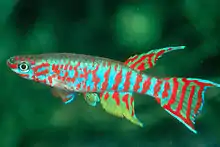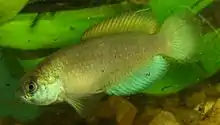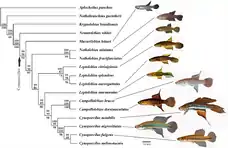Aplocheiloidei
Aplocheiloidei is a suborder of the order Cyprinodontiformes consisting of three families which are commonly known as killifishes.
| Aplocheiloidei | |
|---|---|
 | |
| Aphyosemion elberti | |
 | |
| Austrolebias quirogai | |
| Scientific classification | |
| Kingdom: | Animalia |
| Phylum: | Chordata |
| Class: | Actinopterygii |
| Order: | Cyprinodontiformes |
| Suborder: | Aplocheiloidei Parenti, 1981[1] |
Families
The three families within the suborder Aplocheiloidei are:[2][3]
- Aplocheilidae Bleeker, 1859
- Nothobranchiidae Garman, 1895
- Rivulidae Myers, 1925
Proposed taxonomy
Some authorities have lumped the three families into a single family, Aplocheilidae, a well-established name, chosen for its stability in usage over time, and to avoid the impact of a new name at the family rank for a popular aquarium fish group.[3] Under this proposal, the Aplocheilidae includes three subfamilies: Aplocheilinae for the species from Asia, Madagascar and the Seychelles; Cynolebiinae (called Rivulidae above) for the species from the Americas; and Nothobranchiinae for the species from the African mainland.[4]

References
- Radda AC, Purzl E (1987). Colour Atlas of Cyprinodonts of the Rain Forests of Tropical Africa (PDF). Hofmann. p. 7.
- Nelson JS, Grande TC, Wilson MV (2016). Fishes of the World (5th ed.). Wiley. p. 371. ISBN 978-1-118-34233-6.
- Van Der Laan R, Eschmeyer WN, Fricke R (November 2014). "Family-group names of Recent fishes". Zootaxa. 3882 (2): 1–230. doi:10.11646/zootaxa.3882.1.1. PMID 25543675.
- Costa WJ (2016). "Comparative morphology and classification of South American cynopoeciline killifishes (Cyprinodontiformes: Aplocheilidae), with notes on family-group names used for aplocheiloids" (PDF). Vertebrate Zoology. 66 (2): 125–140.
- Costa WJ (2016-07-18). "Inferring Evolution of Habitat Usage and Body Size in Endangered, Seasonal Cynopoeciline Killifishes from the South American Atlantic Forest through an Integrative Approach (Cyprinodontiformes: Rivulidae)". PLOS ONE. 11 (7): e0159315. Bibcode:2016PLoSO..1159315C. doi:10.1371/journal.pone.0159315. PMC 4948875. PMID 27428070.
This article is issued from Wikipedia. The text is licensed under Creative Commons - Attribution - Sharealike. Additional terms may apply for the media files.
